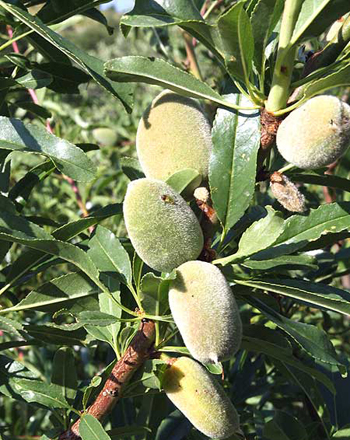Contents:
Common Names | Parts Usually Used | Plant(s) & Culture | Where Found | Medicinal Properties
Legends, Myths and Stories | Uses | Formulas or Dosages | Nutrient Content | How Sold | Bibliography
Scientific Names

Almond Tree |
- Prunus amygdalus L.
- Rose family
Common Names
- Greek nuts
- Jordan almond
Parts Usually Used
Kernels
Back to Top
Description of Plant(s) and Culture

Almonds |
The almond tree usually grows from 10-20 feet high and has lanceolate, finely serrate leaves on thorny branches. The large flowers usually occur in pairs and are soft rose to whitish in color.
Back to Top
Where Found
Cultivated, especially in California, southern Europe, and the Mediterranean countries.
Back to Top
Medicinal Properties
Demulcent, emollient, pectoral
Back to Top
Legends, Myths and Stories

Shelled Almonds |
Almonds are blanched by putting them in boiling water and then into cold water. The skins are easily removed after this procedure.
Called
As far back as 200 BC, the Chinese have used almond oil as a local anesthetic and muscle relaxer. Chinese name is
If you find commercial soap products too drying for your face, check in your local health food store for facial soaps and cleansers derived from almond. The kernel from the almond plant provides us with one of the best face scrubs Mother Nature has to offer, as well as being an excellent emollient (softens skin).
A recent study suggests that almond oil may help prevent heart disease. At the Health Research and Studies Center in Los Altos, California, almond oil was shown to lower serum cholesterol levels in people who consumed it in place of saturated fat. According to the study, almond oil was a more potent cholesterol-reducing agent than olive oil! More studies are needed to determine if almond oil should be part of a heart-healthy lifestyle.
Back to Top
Uses
Good for facial scrubs and cosmetics. The oil derived from a bitter variety of almond has sedative properties and is sometimes used in cough remedies. The oil from a sweet variety makes a soothing ingredient in internal medications and is used externally as an emollient. Almond butter makes a rich protein substitute for peanut butter and is well tolerated by diabetics. Almond oil may reduce cholesterol when used instead of saturated fat.
Oil of sweet almonds combined with powdered sugar is good for a dry cough or hoarseness, taken a little at a time.
The early settlers in the America claimed that if 5 or 6 bitter almonds were eaten before partaking of alcoholic beverages, intoxication is slowed.
Back to Top
Formulas or Dosages
A handful of almond meal makes a good face scrub.
Oil: rub almond oil directly into rough areas of skin, such as hands and heels of feet.
Back to Top
Nutrient Content
Iron, calcium, protein
Back to Top
How Sold
Nuts are sold in supermarkets
Back to Top
Bibliography
![]() The Herb Book
The Herb Book, by John Lust, Bantam Books, 666 Fifth Avenue, New York, NY. copyright 1974.
 Old Ways Rediscovered
Old Ways Rediscovered, by Clarence Meyer, Meyerbooks, publisher, PO Box 427, Glenwood, Illinois 60425, published from 1954, print 1988
![]() Chinese Medicinal Herbs
Chinese Medicinal Herbs, compiled by Shih-Chen Li, Georgetown Press, San Francisco, California, 1973.
 Earl Mindell’s Herb Bible
Earl Mindell’s Herb Bible, by Earl Mindell, R.Ph., Ph.D., Simon & Schuster/Fireside, Rockefeller Center 1230 Avenue of the Americas, New York, New York 10020
![]() The Nature Doctor: A Manual of Traditional and Complementary Medicine
The Nature Doctor: A Manual of Traditional and Complementary Medicine, by Dr. H.C.A. Vogel; Keats Publishing, Inc., 27 Pine Street (Box 876) New Canaan, CT. 06840-0876. Copyright Verlag A. Vogel, Teufen (AR) Switzerland 1952, 1991
![]() Back to Eden
Back to Eden, by Jethro Kloss; Back to Eden Publishing Co., Loma Linda, CA 92354, Original copyright 1939, revised edition 1994
![]() Planetary Herbology
Planetary Herbology, by Michael Tierra, C.A., N.D., O.M.D., Lotus Press, PO Box 325, Twin Lakes. WI 53181., Copyright 1988, published 1992
![]() The Herbalist Almanac
The Herbalist Almanac, by Clarence Meyer, Meyerbooks, publisher, PO Box 427, Glenwood, Illinois 60425, copyright 1988, fifth printing, 1994
![]() The Yoga of Herbs: An Ayurvedic Guide to Herbal Medicine
The Yoga of Herbs: An Ayurvedic Guide to Herbal Medicine, by Dr. David Frawley & Dr. Vasant Lad, Lotus Press, Twin Lakes, Wisconsin, Second edition, 1988.
![]() Webster’s New World Dictionary
Webster’s New World Dictionary, Third College Edition, Victoria Neufeldt, Editor in Chief, New World Dictionaries: A Division of Simon & Schuster, Inc., 15 Columbus Circle, New York, NY 10023
